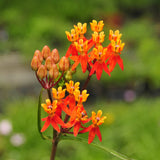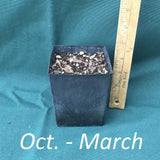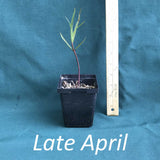Asclepias lanceolata or fewflowered milkweed has vibrant orange-red flowers that bloom on top of tall, slender stems throughout most of the summer.
- Monarch host plant
- Thrives in wet soil
- Long flowering period
Details
- 3 to 4 ft. tall 1 ft. wide
- Long stems with narrow leaves
- Clump-forming habit
- Plants are late to emerge in the spring and can go dormant in early fall
- Hardy in USDA hardiness zones 7, 8, and 9
How to grow
Asclepias lanceolata grows best where it can have full sun and have access to plenty of moisture. Even though the stems appear fragile, they’re very supple and rarely need to be staked when grown in full sun.
Flowering period
In central North Carolina blooming starts in June and can continue through the end of August on mature plants.
Care and maintenance
If planted in a moist enough location, plants are carefree. Site well away from more vigorous plants that may out complete it.
Where to plant
Ideal companion for carnivorous plants in artificial bogs.
When to plant
From spring through mid-summer when they are actively growing.
Spacing
12 to 18 inches apart if planting them in a group.
When will my plant flower?
Plants are flowering size and will bloom their first year if grown in full sun and kept constantly moist.
Native habitat and range
Savannas, fresh and slightly brackish marshes along and coastal plain from New Jersey into Florida.
Source and origin
Plants grown from seeds collected on the edge of a swamp in Pender County, North Carolina.
Comments
Fewflowered is an unfortunate common name for this striking milkweed. The flower clusters may have fewer individual flowers than other milkweed species, but its cheerful flower color and long flowering season more than make up for it.
| States | Orders up to $50 | Orders $51 to $100 | Orders over $100 |
| AL, DE, GA, KY, MD, NC, OH, PA, SC, TN, VA, and WV | $16 | $18 | $20 |
| AR, CT, FL, IL, IN, LA, MA, MI, MO, MS, NH, NJ, NY, RI, VT, and WI | $18 | $20 | $22 |
| IA, KS, ME, MN, OK, and TX | $20 | $22 | $24 |
| CO, NE, ND, and SD | $22 | $24 | $26 |
Sorry, we can't ship plants outside of the continental United States or to AK, AZ, CA, ID, NM, NV, OR, UT, and WA due to agriculture restrictions.
We now ship Sarracenia plants bareroot (while dormant during the winter) to Western States. Please contact us with your zipcode for a shipping quote.
When will my order be shipped?
All plants are shipped within two weeks of placing an order.
Is it okay to plant in the winter?
Yes, as long as the soil is not frozen. Planting native perennials in winter and early spring gives your plants a head start before the summer heat arrives.
What if it’s too cold to plant where I live, but I want to buy a plant before it sells out?
Dormant plants can safely be kept in a basement, garage, or cool room until you are ready to plant in late winter or early spring.
How will my plants get delivered?
Most orders are shipped on Monday or Tuesday with either UPS Ground, USPS Ground Advantage, or USPS Priority Mail, which depending on the destination takes between 1 to 4 days.
Are your plants shipped in their containers?
Yes, all our plants are shipped in their growing containers. The majority are grown in containers that are 4.5 inches wide by 5 inches deep and 32 fl. oz. / 946 ml in volume.
Do you guarantee your plants?
We guarantee our plants to be healthy, ready for planting and correctly named. We are not able to guarantee whether a plant will grow in your garden as there are too many circumstances that are beyond our control.
On rare occasions, a plant shipped dormant may fail to emerge from its dormancy. If this happens, please let us know. If you are concerned about a plant, please contact us within 14 days to let us know. If we can’t help you make it grow, we’ll send you a new plant or issue a refund.
Can I return my plants?
You can return your plants if you no longer want them once they arrive. To receive a refund (minus 20% restocking fee) the plants must be returned in good condition. Return shipping is the customer’s responsibility.
Can I cancel my order?
Yes, you can cancel your order. Please visit our terms and service page for details.
What about sales tax?
We propagate our own plants and are not required to collect North Carolina sales tax.
Where can I find information about your plants?
Here are some FAQ on how we grow plants.









